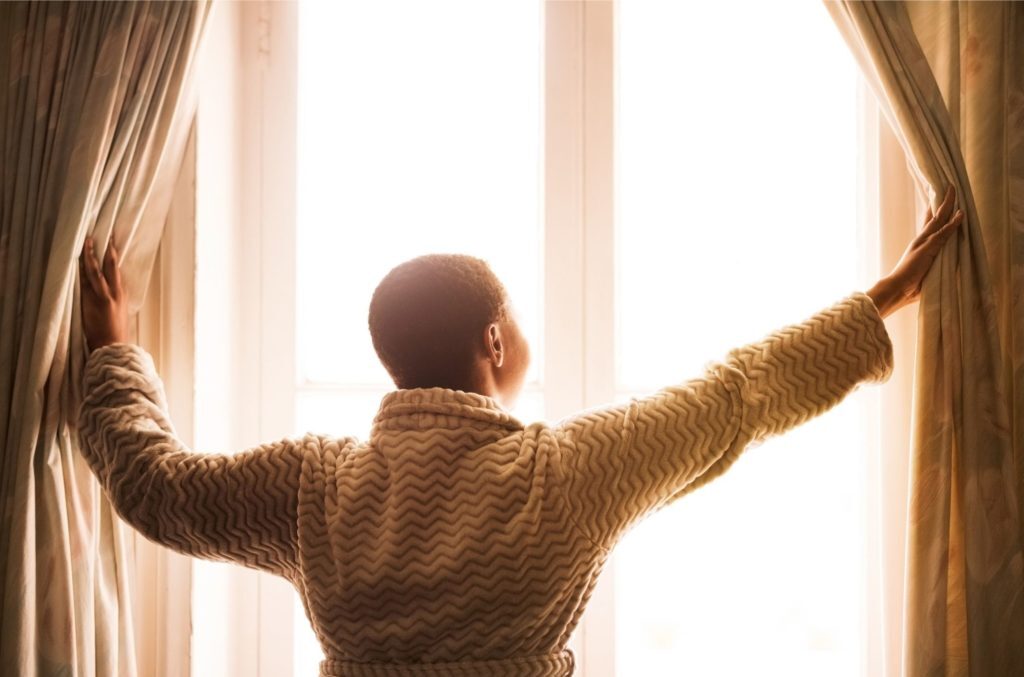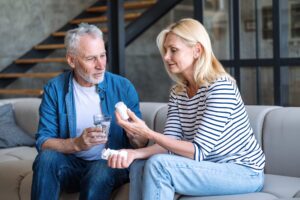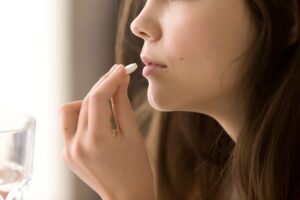Summary
- While “hangover depression” isn’t a clinical diagnosis, understanding how alcohol impacts brain chemistry and sleep can shed light on its effects. Alcohol initially acts as a stimulant, increasing levels of dopamine and serotonin, which enhance mood temporarily. However, as alcohol suppresses brain activity, it transitions into a depressant, impacting cognition, coordination, and mood over time.
- Alcohol disrupts sleep patterns by prolonging lighter sleep stages at the expense of deeper, more restorative stages like delta-wave and REM sleep. This disruption contributes to feelings of grogginess, irritability, and can exacerbate symptoms of depression and anxiety.
- Beyond its immediate effects on neurotransmitters and sleep, alcohol can also heighten anxiety levels, a phenomenon sometimes referred to as “hangxiety.” This occurs as alcohol impacts serotonin levels, potentially increasing anxiety upon sobering up.
- Using alcohol to cope with negative emotions can lead to a cycle of dependence and exacerbate underlying mental health conditions like depression and anxiety. Over time, alcohol tolerance may increase, necessitating larger quantities to achieve the same calming effects, which can further complicate mental health issues.
- Managing hangover depression involves practical steps such as hydration, rest, and engaging in activities that promote emotional and physical well-being. Additionally, moderating alcohol intake, spacing out drinks with water, and eating before drinking can help mitigate the impact of alcohol on mood and sleep.
For people with anxiety and depression, purposefully engaging in pleasurable activities can improve mental health. If you experience hangover depression, try these 6 tips to ease symptoms now and avoid them in the future.
A hangover after some heavy drinking is enough to impact anyone’s mood negatively. But, for some people, it’s more than just shaking off a bad mood. Though “hangover depression” isn’t a clinical diagnosis, the impact alcohol has on your brain can actually lead to a depressed mood. We’ll show you why you experience depression when you’re hungover and how to prevent it in the future.
Why you get hangover depression
The term hangover depression refers to feelings of low mood, apathy, and sadness following alcohol consumption. This phenomenon isn’t fully understood, but a few contributing factors can offer us a better understanding. First, we’ll look at how alcohol affects your brain chemistry, then we’ll explore the toll it takes on your sleep, and finally, we’ll look at underlying depression.
Alcohol and depression
Alcohol activates reward pathways in the brain, releasing chemical messengers like dopamine and serotonin. They make you feel happy, friendly, and confident—so why do people say alcohol is a depressant?
Yes, alcohol can feel stimulating and, while the amount of alcohol in your blood is rising, it may improve your mood. When you hear people talking about alcohol as a depressant, in this context, the term “depressant” refers to the way alcohol changes brain activity, not mood.
Alcohol mimics the effects of GABA, a neurotransmitter that inhibits electrical activity in your brain. Natural depression of the central nervous system is necessary to balance physiological functions, but problems arise when alcohol creates this kind of inhibition artificially.
Alcohol is a depressant.
The more you drink, the more alcohol slows the transmission of brain signals. Another way to say this is that the more you drink, the more depressed your body’s normal functioning becomes.
Eventually, this can lead to slurred speech, delayed reaction times, impaired coordination, drowsiness, and slow breathing. Using depressants in excess can be dangerous and even deadly. But depressants don’t necessarily lower your mood.
Even though the term “depressant” isn’t directly referring to the mood disorder, heavy drinking is associated with the development of clinical depression. People with alcohol use disorder are more likely to develop major depression than those without it. All in all, depression and alcohol aren’t a helpful combo.
Neurotransmitters aren’t the whole story, though. Several other factors contribute to depression, including sleep.
Drinking causes sleep disruptions.
Alcohol may help you fall asleep more quickly, but it can rob you of a good night’s rest by disrupting your sleep cycle. Poor sleep can increase the likelihood you’ll experience hangover depression.
Your body’s sleep cycle involves two types of sleep known as REM and NREM, which stand for sleep that involves rapid eye movement or non-rapid eye movement. While your body rebuilds itself throughout the NREM stages, the bulk of recovery happens in the delta-wave phase of sleep. From there, you transition into REM sleep, which is closely associated with mood regulation and mental health.
Though REM sleep is known as the part of sleep that restores the mind, research shows that delta-wave sleep also improves cognition and contributes to memory formation.
Under normal circumstances, you go through about 4 – 6 complete cycles a night. However, if your body is still processing alcohol, you may never reach the deeper and most productive stages of sleep.
Alcohol prolongs light sleep at the expense of delta-wave and REM sleep, often leading to frequent awakening, daytime grogginess, and even nightmares.
If alcohol is interfering with your rest, bouncing back from a night out gets complicated. Over time, the damage from this kind of sleep deprivation compounds itself.
Research shows that insomnia and other sleep disturbances may put you at a higher risk for major depression, generalized anxiety disorder, and other health problems.
Alcohol can lead to anxiety.
Alcohol impacts your brain’s normal chemical levels and interferes with its communication pathways. In fact, you may notice that you feel high levels of anxiety after drinking, or “hangxiety.”
Because of the way alcohol impacts serotonin levels in your brain, you may have higher anxiety levels when sobering up than you did when you started drinking. Though it seems like a drink helps you relax, using alcohol for anxiety can actually harm your mental health.
People often turn to a drink as a way to relax or wind down. Drinking alcohol for relaxation isn’t necessarily bad for your health if done in moderation and with the approval of your healthcare team.
But for some people, the occasional drink to soothe anxious feelings can become a pattern. This can be especially risky if you also experience social anxiety disorder. Alcohol use disorders frequently occur with anxiety and depressive disorders.
Using alcohol to cope
Alcohol can add to your life, but if you’re using it to stifle negative emotions, you may develop an unhealthy relationship with drinking. Using alcohol to cope might not seem like a big deal initially, but it can develop into more than just a casual habit for some people.
Many people with underlying mental health conditions use alcohol and other intoxicants as a form of self-medicating.
Alcohol really does seem to help decrease anxiety, depression, and other forms of mental illness—at first. As you build a tolerance to alcohol, you may find yourself drinking more and more to achieve the same levels of ease.
Over time you may become not only psychologically addicted but also physically dependent. Both alcohol dependence issues and depression can negatively impact your intimate relationships.
As time goes on, alcohol can hurt your mental health. With evidence that alcohol can make depression and anxiety worse, it’s essential to build coping skills to help you in the long run.
Some helpful coping skills are distress tolerance, learning your triggers, and using meditation and other relaxing exercises to ease tension in your body and mind instead of drinking.
How to feel better now
If you’re currently dealing with hangover depression, there are a few things you can do right now to start feeling better. Focus on giving your body and mind what they need most to recover: water, rest, and time.
1. Hydrate
Because alcohol dehydrates your system, it’s crucial you get enough fluids. Drink plenty of water and other clear liquids like herbal tea. These will help restore optimum functioning in your body and aid your physical and emotional recovery process.
2. Get some exercise
It’s counterintuitive, but a good gym session can leave you energized. Exercise gets your blood pumping and may help you feel like yourself again. You can also use it to combat some of the physical symptoms of depression.
You don’t have to push yourself as hard as usual unless you want to; the point is just to get up and move your body in any way that feels right. In addition to the physical benefits, getting a workout often gives people a sense of productivity and accomplishment.
3. Do what feels good
We all need to take a personal day from time to time. There isn’t anything wrong with taking time to care for your physical and mental health. In fact, days like that can increase productivity, clarity, and alertness.
Instead of using your energy worrying, spend it doing anything that feels good to you. That might mean spending the day in the park with your dog, cooking nourishing food for yourself, doing some yoga or other embodied practice, or taking a relaxing bath.
Hangovers are taxing, so take the day to replenish your emotional and physical energy. Tomorrow is a new day, and you’ll be all the more prepared for it if you give yourself a chance to recover.
4. Connect with a friend
Trusted friends can help ground you in reality. If you’re stuck, catastrophizing, or feeling trapped in some other harmful thought spiral, talking with a friend can interrupt those patterns. When you’re feeling down or troubled, calling up a friend is a great way to get out of your head. You don’t have to talk about what’s upsetting you if that doesn’t feel helpful. Sometimes taking your mind off of a subject is just as healthy as talking it out.
5. Don’t use more alcohol to cope
Though it may seem like a good solution to ease your hangover, drinking to cope will only punt your current experience into the future. The next time the hangover comes around, it’ll likely be worse than it is right now. Like we just mentioned, the only way to get over your hangover is to give yourself time.
6. Mental junk food
Daytime television and trashy books were invented for people stuck at home, so now’s the best possible time to indulge them. The only proven cure for a hangover is time, so do whatever you can to help it pass.
How to avoid it next time
Alcohol is easy to overdo, but you can enjoy your night out without paying the price in the morning with some planning. If you have a hard time with hangover depression, try some of these simple strategies to curb your alcohol intake.
1. Practice moderation
According to the National Institute on Alcohol Abuse and Alcoholism (NIAAA), more than 4 drinks per day for women and more than 5 drinks per day for men is alcohol misuse.
The key to a healthy relationship with alcohol is balance, which usually boils down to habits. The best way to break any habit is to take small steps and trust the process. Set yourself up for success by taking stumbling blocks out of your path. Surround yourself with people who help you stay the course and make your environment suited to your goals.
Let them know your goals of trying to be healthier and limiting your alcohol intake. It turns out, creating an environment and surrounding yourself with supportive people makes it easier to accomplish your goals.
Don’t worry about getting there quickly. Minor adjustments add up, and it will be easier to embrace your new lifestyle when you take the time to warm up to it.
2. Space out your drinks
It takes about an hour to process one serving of alcohol completely. If you drink faster than that, you may push yourself past the point you meant to go as each drink compounds the effects of alcohol. Pace yourself to give your body a chance to stay on top of clearing alcohol from your system.
3. Drink water in between
Ordering a glass of water in between drinks can help you pace yourself and stay hydrated. Water won’t prevent the absorption of alcohol, though, so try to drink no more than one alcoholic drink per hour.
4. Eat small meals
Eating before you drink will also help slow and limit the absorption of alcohol, so it’s a good idea to start your night off with a light meal. People tend to crave greasy foods when drinking, so having food on your stomach beforehand can help curb the temptation to go for a late-night fast-food run.
5. Get enough rest
Sleep is foundational in physical and mental health. Try to get at least 8 hours of high-quality, uninterrupted sleep every night and avoid drinking close to bedtime.
6. Consider taking a break.
Some people find moderation isn’t possible or that the pain caused by drinking is too much. If this lines up with your experience, there you might want to consider abstinence from alcohol, at least for now.
When to seek help
Over time, alcohol can actually worsen any mental health difficulties you experience. Especially if you find yourself drinking more and more often, it’s likely that your tolerance will increase. As a result, you’ll need to drink larger quantities to get the same level of relief.
Alcohol and depression can be risky in combination since each one feeds and complicates the other. If you’re experiencing alcohol use issues and depression, you may feel trapped in a vicious cycle. We want you to know that there’s a way out.
No matter the amount or frequency of your drinking, if the way you’re using alcohol or other substances causes concern for you or your loved ones, you don’t have to wait to seek assistance. For more information on treatment, visit the Substances and Mental Health Association (SAMHSA).
We want to stress that there’s never a wrong time to get help. Talk to your provider if you think you may be depressed, if the way you drink causes you or your loved ones to worry, or both.
There are so many different ways to get support for substance use issues that there’s a good chance you can find a solution that works for you. If you experience depression after drinking, consider learning more about substance treatment options.
Takeaways
- Anxiety and symptoms of depression are associated with alcohol intake.
- Alcohol keeps you in the lighter stages of sleep, depriving you of REM and delta-wave sleep.
- Moderation, hydration, and proper rest can mitigate hangover depression.
- If you suspect that you have depression or a drinking problem, reach out to your healthcare provider.












